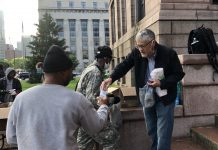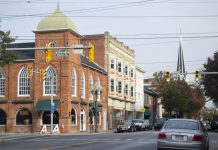By Aneurin Canham-Clyne
Published February 9, 2021
A 12-year legal battle over Boise, Idaho, laws that criminalized sleeping and camping in public ended with a settlement Monday, locking in place a federal appellate court ruling that makes it unconstitutional for cities on the West Coast to arrest people for sleeping outside if there are no available shelter beds.
Homeless people in Boise with nowhere else to sleep can no longer be arrested for doing so in public, under the terms of the settlement announced by the city and plaintiffs. Eric Tars, the lead attorney on the case for the National Homelessness Law Center, said the settlement also includes additional city funds to pay for alternative shelters and housing programs.
“The best outcome is you don’t have to enforce the ordinance at all, because people are in housing,” Tars said.
“The City of Boise is happy to have reached an agreement that advances our goal of putting those experiencing homelessness on a path to permanent housing and is consistent with the current city policy,” Mayor Lauren McLean said in a separate press release issued by the City of Boise.
The settlement contained $1.335 million for services for the homeless, a third of which is set aside to expand emergency overnight shelter space, according to the city.
Tars said the money can’t be used by shelters that don’t take into account disability, mental health and family status, or by shelters that require religious participation by residents.
“The settlement represents the efforts of hundreds of homeless citizens of Boise who were prevented from accessing overnight shelter to sleep due to a disability, limited shelter capacity and shelter policies,” Howard Belodoff, the associate director of Idaho Legal Aid Services, said in the plaintiff’s press release.
Robert Martin et al. v. City of Boise was filed in 2009 after homeless residents in Boise were arrested for sleeping or camping in public, court records show. Boise laws will be changed to reflect the new legal context.
In 2018, a panel of judges from the 9th U.S. Circuit Court of Appeals found Boise’s laws punishing homeless residents for sleeping in public when there was no alternative shelter available violated the 8th Amendment’s protections against cruel and unusual punishment. A year later, the Supreme Court declined to take up the case.
“The settlement leaves Martin as settled law in the Ninth Circuit, binding in all of the Ninth Circuit,” Tars said.
Boise said in a statement that it will “amend two ordinances to bring them in line with the city’s current practice of protecting the constitutional rights of those who are unable to access shelter based on disability, sexual orientation, or religious practices. This agreement is a roadmap to a final dismissal of all remaining claims against the City.”
In early 2020, the Howard Center for Investigative Journalism examined laws criminalizing homelessness in 54 cities with high homeless rates. Sleeping or camping in public was illegal in 43 of those 54 communities, many of them on the West Coast.
The states covered by the 9th Circuit are home to a majority of the nation’s population of unsheltered homeless people. They include California, Oregon, Hawaii, Washington and Nevada, all of which had high rates of unsheltered homelessness before the COVID-19 pandemic.
“Nobody should feel fear from police for doing something that is a basic human need. I hope that with this settlement we can open the doors to finding a better solution to the homeless crisis,” Robert Martin, the lead plaintiff, said in the settlement announcement.
“I am really looking forward to seeing what other cities come up with as time goes on, especially when the City of Boise will have laid down the foundation for what it could look like,” Pamela Hawkes Duke, another of the plaintiffs, said.
Tars said the settlement opened a workable path forward for other cities, and characterized it as a win-win-win, since incarceration can cost more than services.
“This settlement shows the best way forward by investing more than a million dollars into new housing, non-congregate shelter and services. The city’s going to decrease the number of encampments in Boise permanently by housing people rather than by arresting them,” Tars said.
Tars emphasized that providing shelter to the homeless would achieve one of the goals of more punitive approaches, getting homeless people off the streets, without punishing them for being homeless.
“When you give them that alternative, people will see that all these years of heavy enforcement never worked,” Tars said.





